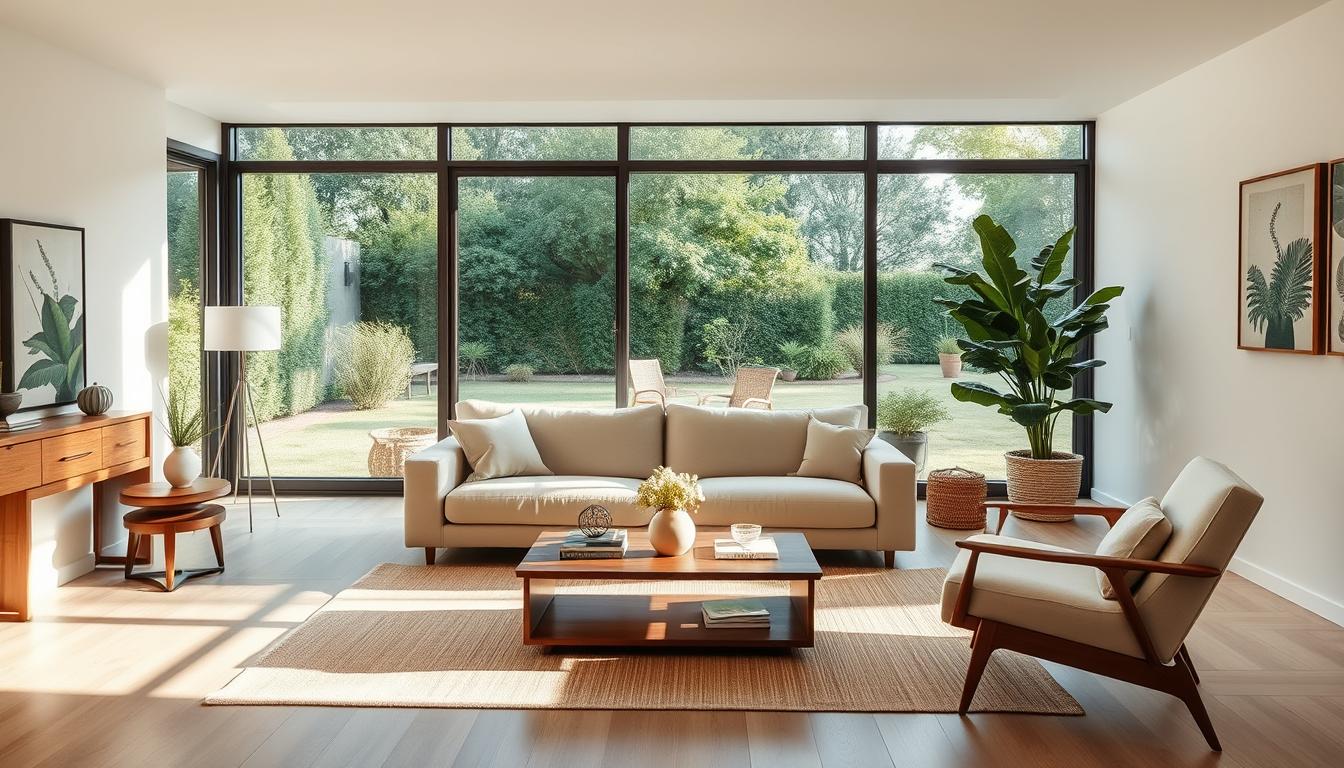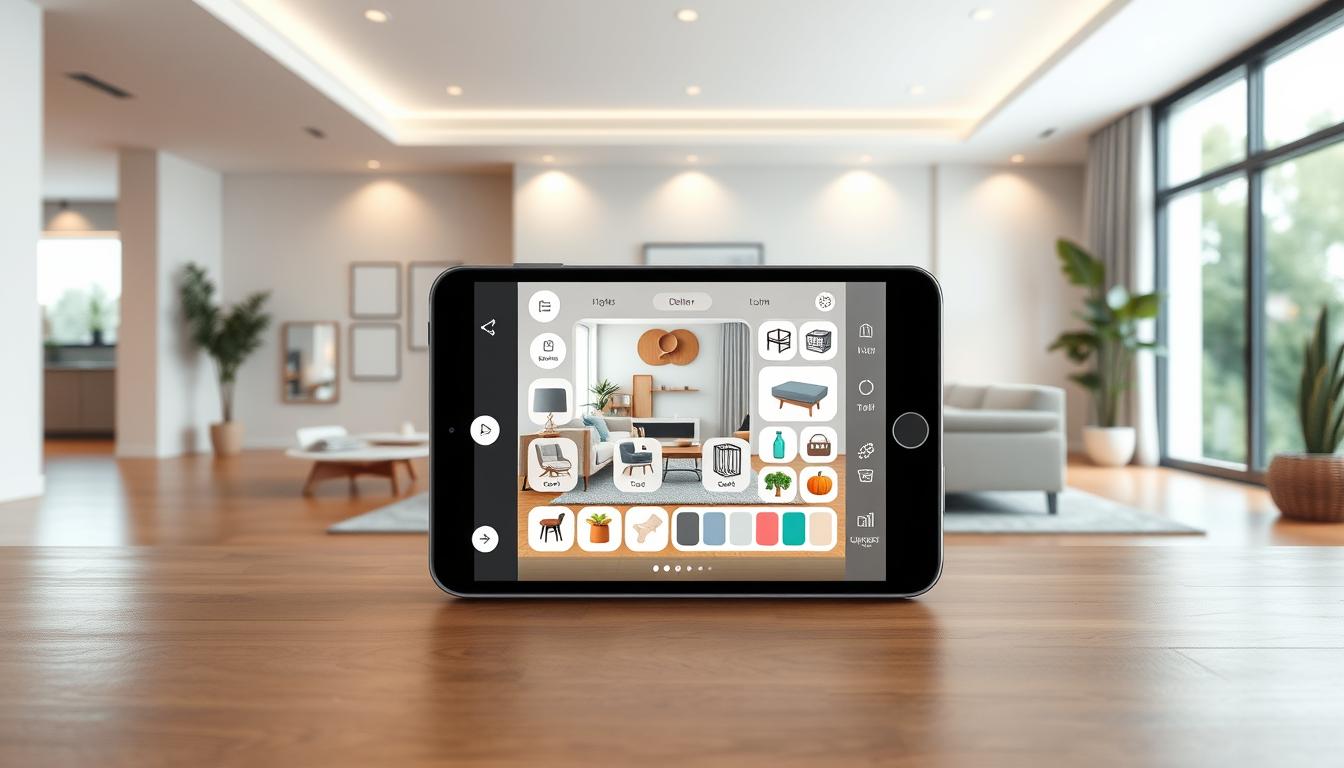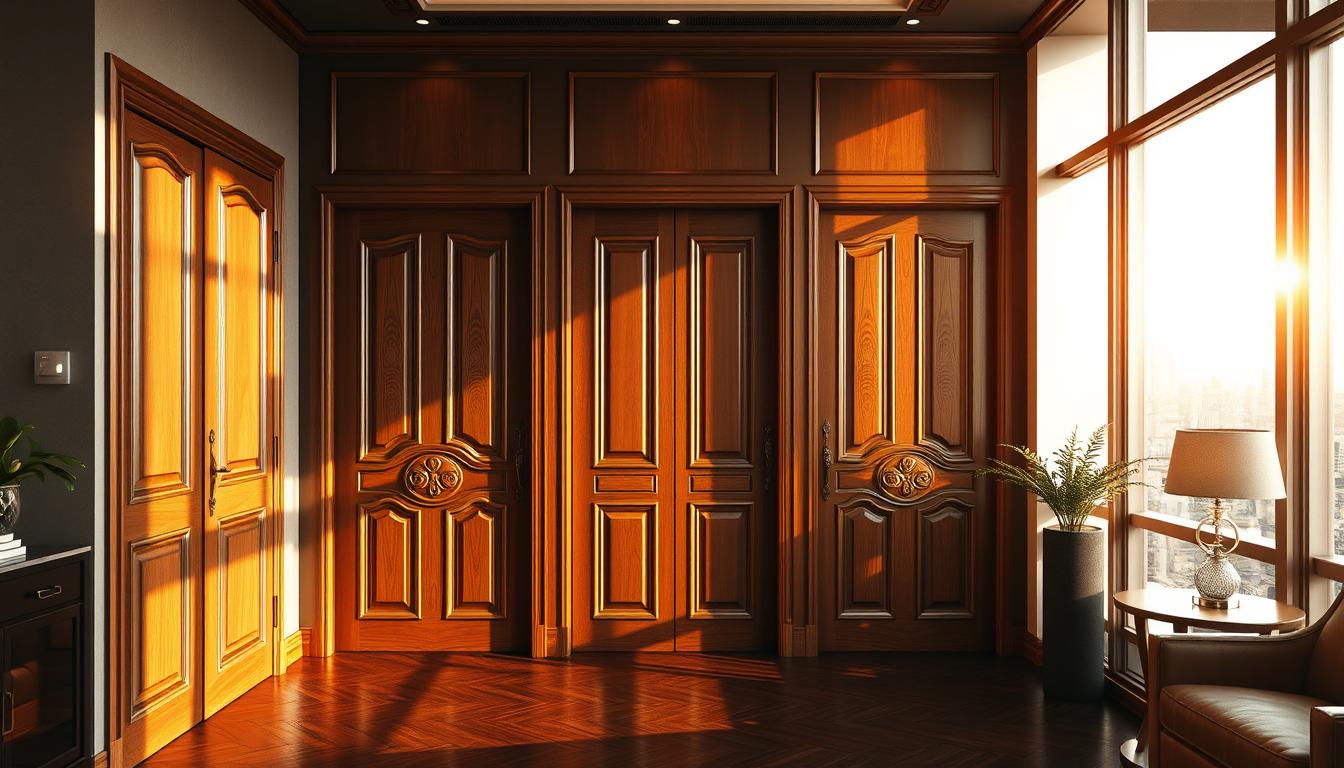Did you know a well-designed living space can make you happier and more productive? With today’s trends and ideas, we can turn our homes into cozy and welcoming places.
Keeping up with the newest modern home interiors is key to showing off our style. By adding new design touches, we can make our homes better and more useful.
Key Takeaways
- Stay updated with the latest trends to elevate your living space.
- Incorporate fresh design elements to reflect your personal style.
- Transform your home into an inviting and comfortable haven.
- Boost your mood and productivity with a well-designed space.
- Create a functional living area that meets your needs.
1. Understanding Your Space: Identifying Style and Functionality
To make your home look its best, start by understanding its layout, lighting, and how it works. It’s key to look at your space in detail.
How to Analyze Your Room’s Layout
Start by measuring your room and noting where doors, windows, and built-in features are. This helps you figure out the best way to arrange furniture and spot any design hurdles.
For example, rooms with unique shapes or big windows need special thought when picking furniture and decor. Knowing your room’s layout helps you make a space that’s both useful and stylish.
Assessing Natural Light and Color
Natural light greatly affects your room’s feel and function. Figure out how much light your room gets and where it comes from. This helps pick the right colors and where to put furniture.
Think about the color’s temperature and how it will work with the light. Cool colors can make a room feel bigger and more lively. Warm colors can make it cozy. Balancing light and color creates a welcoming space.
“The right color palette can make or break the ambiance of a room. It’s essential to choose colors that not only reflect your personal style but also complement the natural light and existing architectural features.”
Considering Your Lifestyle Needs
When designing, think about how you live and what you do in your home. This helps you decide what your space needs in terms of function and style.
| Lifestyle Needs | Design Considerations |
|---|---|
| Entertaining guests | Open layout, comfortable seating, and ample lighting |
| Working from home | Dedicated workspace, good lighting, and ergonomic furniture |
| Relaxation and leisure | Cozy seating, soothing colors, and calming textures |
By understanding your lifestyle and designing with it in mind, you can create a space that’s both beautiful and practical.
2. Popular Interior Design Styles to Inspire You
Exploring different interior design styles can spark inspiration for your home decor. There are many styles to choose from. You can pick one that shows off your personality and taste.
Modern Minimalism
Modern Minimalism is all about simplicity and function. It has clean lines, little decoration, and a simple color scheme. To add Modern Minimalism to your home, use monochromatic color schemes and minimally patterned textiles.
Modern Minimalism includes:
- Open spaces
- Simple furniture designs
- A limited color palette
Bohemian Chic
Bohemian Chic celebrates individuality and creativity. It mixes vintage and global items, rich textures, and bright colors. To add Bohemian Chic to your home, include vintage furniture pieces and colorful textiles.
Bohemian Chic is known for:
- Layered textiles and rugs
- Unique, one-of-a-kind decorative items
- A mix of bold, vibrant colors
Industrial Elegance
Industrial Elegance is inspired by old factories and industrial spaces. It features exposed brick, metal accents, and reclaimed wood. To get Industrial Elegance in your home, add exposed ductwork and metal lighting fixtures.
Industrial Elegance includes:
- Exposed structural elements
- Industrial materials like metal and concrete
- A predominantly neutral color scheme
By knowing these popular interior design styles, you can pick the best one for you. Use it as a guide to create a beautiful and functional living space.
3. Choosing the Right Color Palette for Your Home
A well-chosen color palette is key to a beautiful home. It affects how your space looks and feels. When picking colors, think about how they’ll work together to create a nice atmosphere.
How to Select a Base Color
Choosing a base color is the first step. This color will be the main one in your space. It’s important to pick one that shows your style and fits your home’s natural light. Think about the mood you want: calm, energetic, or sophisticated.
For a calm feel, soft blues or greens are great. For something bold, rich jewel tones work well. Look at color palettes online or in design magazines for inspiration.
Accent Colors that Pop
After picking your base color, choose accent colors to add depth. These colors should match your base but also bring something new. For a fancy look, metallics like gold, silver, or copper are great.
It’s important to balance your accent colors with your base. Use the 60-30-10 rule: 60% base color, 30% secondary, and 10% accent. This keeps your space from feeling too busy.
The Psychology of Color in Home Decor
Colors deeply affect our feelings and actions. Knowing the psychology of colors helps you choose wisely. For example, blue is calming, while red is energizing.
“Color is a power which directly influences the soul. Color is the keyboard, the eyes are the hammers, the soul is the piano with many strings. The artist is the hand that plays, touching one key or another, to cause vibrations in the soul.” – Wassily Kandinsky
Let’s look at how colors affect our homes:
| Color | Emotional Impact | Suitable Rooms |
|---|---|---|
| Blue | Calmness, Trust | Bedrooms, Living Rooms |
| Red | Energy, Passion | Dining Rooms, Kitchens |
| Green | Balance, Growth | Living Rooms, Bathrooms |
Understanding color psychology lets you create a space that looks and feels great.
4. Furniture Selection: Finding What Fits
To get the look you want, picking the right furniture is crucial. The right pieces can change a room, making it both useful and beautiful.
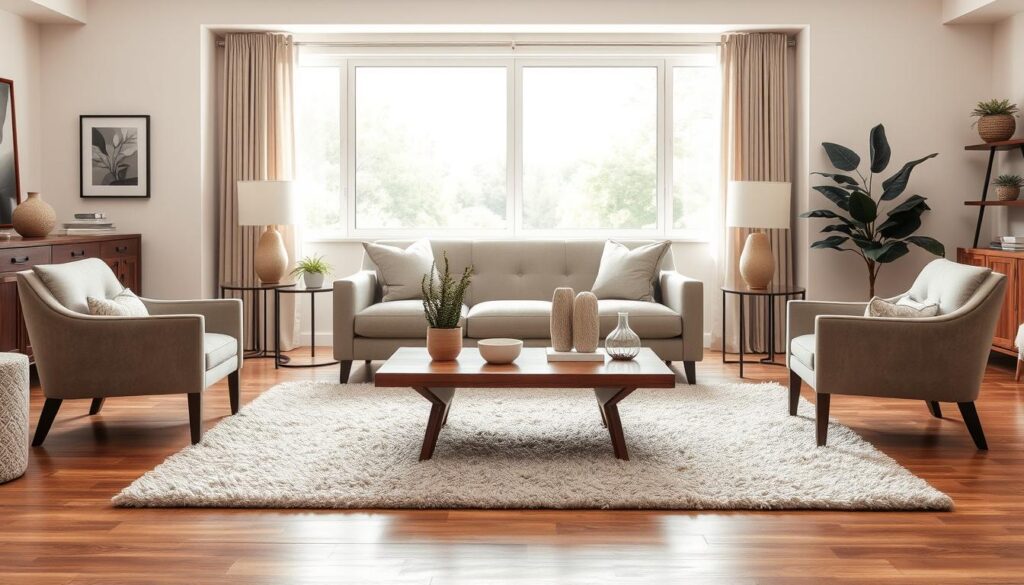
Measuring Your Space for the Perfect Fit
Before you buy furniture, measure your space carefully. You need to measure the room’s size and think about how things will move around. Accurate measurements help ensure your furniture fits well, leaving room to move.
As
“Good design is all about making the complex simple,”
said John Maeda, getting your space right makes choosing furniture easier.
Investing in Quality vs. Quantity
The debate on quality versus quantity in furniture is ongoing. Choosing a few high-quality pieces is often better than buying lots of cheap items. These cheap items might need to be replaced often.
- Quality furniture is made with better materials and craftsmanship.
- It lasts longer and is more durable.
- It can also make your home look better.
Mixing and Matching Styles
Mixing different furniture styles can make your home unique. The trick is to find something that ties everything together, like a similar color or material.
For example, mixing modern and vintage pieces can be interesting. Interior design experts say the key is to balance styles while keeping the room harmonious.
5. Lighting: The Key to Ambiance
Lighting is key in interior design, changing how a room feels. It can make a space feel welcoming and visually appealing.
Types of Lighting: Ambient, Task, and Accent
Knowing the different lighting types is important. There are ambient, task, and accent lighting.
- Ambient lighting lights up a room, making it easy to see and move.
- Task lighting helps with activities like reading or cooking.
- Accent lighting highlights special features or areas in a room.
Using these lights together creates a rich, inviting atmosphere.
Choosing Light Fixtures to Match Your Style
Finding the right light fixtures is key for both looks and function. They should match your home’s design.
In modern home interiors, sleek fixtures work best. Traditional homes look great with ornate designs.
| Lighting Style | Description | Best For |
|---|---|---|
| Modern | Sleek, minimalist designs | Modern homes, minimalist decor |
| Traditional | Ornate, classic designs | Traditional homes, classic decor |
| Industrial | Metal fixtures, exposed bulbs | Loft spaces, industrial decor |
Layering Light for Depth and Warmth
Layering light makes a space interesting and inviting. Mixing ambient, task, and accent lighting creates a balanced look.
This method adds interior design inspiration and makes your space lively.
6. Accessories that Make a Statement
To make your home look stylish, pay attention to the little things, like accessories. They can make your home feel personal and welcoming.
The Power of Artwork and Wall Decor
Art and wall decor do more than just look good. They spark conversations and add depth to your walls. Choose art that matches your room’s style and colors. A big piece can be the room’s star, or a bunch of small ones can make a cool gallery wall.
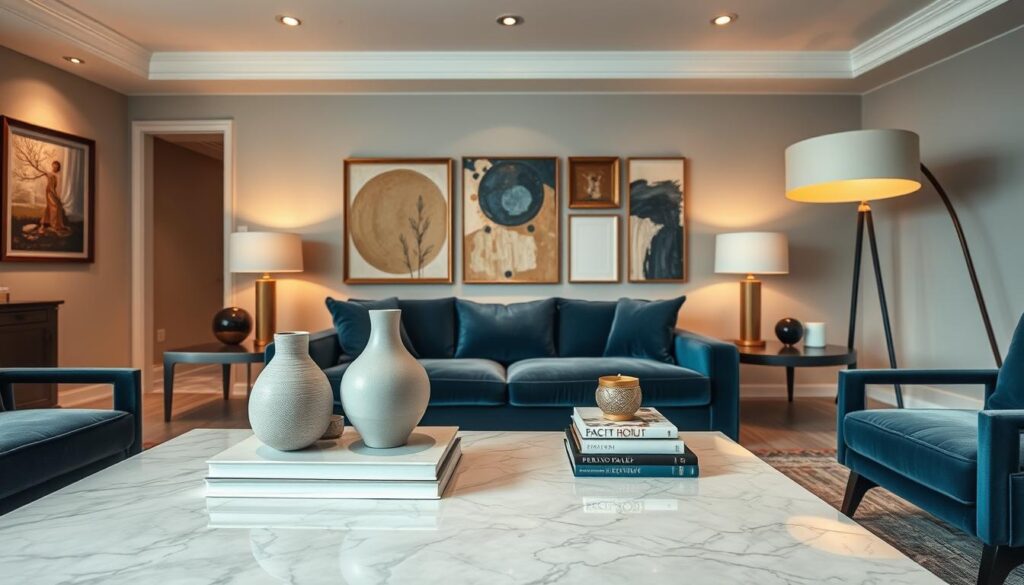
Incorporating Textiles: Rugs, Curtains, and Throws
Textiles are key in home decorating, adding warmth, texture, and color. Rugs can mark off areas in open spaces, and curtains control light. Throws and pillows add color and make things cozy. Pick materials, patterns, and colors that fit with what you already have.
Adding Plants for a Natural Touch
Adding plants to your decor brings in a fresh, natural vibe. They clean the air and make your space look better. You can pick from easy-to-care-for succulents to lush ferns, based on your space and light.
By choosing the right accessories like art, textiles, and plants, you can make your home stylish and welcoming. It will show off your personality and style.
7. Creating Functional Spaces: Tips for Specific Areas
A well-designed home balances form and function, making everyday living more enjoyable. It’s key to think about each area’s specific needs. This way, you create spaces that are both beautiful and functional.
Designing a Cozy Living Room
The living room is the heart of the home, where family and friends gather. To make it cozy, use warm lighting and comfortable seating. Add textiles like throw blankets and rugs in warm colors to make it cozier.
For interior design trends, adding natural elements like plants or a statement piece of artwork can make your living room more interesting.
Functional and Stylish Kitchen Ideas
The kitchen is key for both function and style. Focus on efficient storage solutions and streamlined countertops. Add creative home decor like a stylish backsplash or decorative lighting fixtures.
By mixing form and function, you can make a kitchen that looks great and works well for cooking and entertaining.
Bedroom Retreat: Comfort Meets Style
Your bedroom should be a cozy retreat. Focus on comfortable bedding and calming colors. Use soft lighting and soothing textiles to enhance the ambiance.
Adding interior design trends like a statement wall or a stylish area rug can make your bedroom unique and inviting.
8. Open Spaces vs. Defined Areas: What Works for You?
Choosing between open floor plans and separate rooms is key. It affects how our homes look and work. We’ll look at the good sides of open spaces, how to make closed areas work, and the smart use of room dividers.
Advantages of Open Floor Plans
Open floor plans are popular for a reason. They make homes feel bigger and help people socialize. This layout is great for families, letting parents watch kids while cooking or working.
Open plans make small spaces seem bigger. Without walls, areas feel more open and light. Plus, you can arrange furniture in many ways, thanks to fewer walls.
“An open floor plan is not just about removing walls; it’s about creating a flow that connects different areas of your home.”
Creating Harmony in Closed Spaces
But, sometimes closed spaces are better. For example, when privacy matters or family members have different schedules. Separate rooms offer quiet time.
To make closed spaces feel connected, focus on lighting and colors. Use the same colors in nearby rooms to tie them together. Smart lighting can also link spaces, making them feel part of the whole home.
Using Room Dividers Effectively
Room dividers are perfect for finding a middle ground. They come in many styles, like sliding panels or shelving units. These can mark off areas in an open plan or separate a small room.
When picking a room divider, think about its use and look. For example, a shelving unit can divide and store things. A curtain or screen can also separate areas without changing the space forever.
| Divider Type | Functionality | Aesthetic Appeal |
|---|---|---|
| Sliding Panels | Highly versatile, can be used to completely separate or partially divide a space | Available in various materials and designs, can be customized to fit home decor |
| Shelving Units | Provides storage while dividing the space | Can be stylish, when used to display decorative items |
| Curtains/Screens | Easy to install and remove, offers flexibility | Variety of fabrics and patterns available, can add a decorative touch |
Understanding the pros of open spaces and closed areas helps homeowners decide. Whether you choose an open plan, separate rooms, or a mix with dividers, the goal is to create a space that suits your lifestyle and taste.
9. Sustainable Interior Design Practices
We’re now more aware of environmental issues and want healthier homes. Sustainable interior design is key in modern homes. It’s not just a trend, but a must for our planet.
Our choices in materials, energy use, and waste matter more than ever. Sustainable design makes our spaces beautiful, useful, and good for the earth.
Eco-Friendly Materials to Consider
Choosing eco-friendly materials is crucial in sustainable design. These materials are made with less harm to the environment. Here are some options:
- Reclaimed Wood: Old wood adds charm and saves new trees.
- Bamboo: A fast-growing plant for flooring and more.
- Low-VOC Paints: Better air and health in your home.
Upcycling Furniture for a Unique Touch
Upcycling old furniture is green and adds flair. It breathes new life into old pieces, cutting down on waste.
Here are some upcycling ideas:
- Turn an old door into a coffee table or art.
- Give vintage chairs a new look with eco-friendly fabrics.
- Make shelves or headboards from pallets.
Energy Efficiency in Home Decor
Energy efficiency is vital in sustainable design. Simple changes can cut our energy use and make homes greener.
Here’s how to save energy:
- LED lights use much less power than old bulbs.
- Smart thermostats help control heating and cooling.
- Good insulation keeps your home cozy without wasting energy.
By using these sustainable practices, we can make homes that are stunning, useful, and kind to the earth. As we look at interior design, let’s remember our choices can help our planet.
10. Trends to Watch in Home Decor This Year
Home decor trends this year focus on showing off your personality. We’re seeing a mix of old and new, with a personal touch. It’s all about making your home truly yours.
Incorporating Vintage Elements
Vintage decor is back in style. People are adding antique furniture and classic patterns to their homes. It’s all about adding character and depth.
- Look for unique, one-of-a-kind vintage pieces to add to your collection.
- Mix vintage items with modern decor to create a visually interesting space.
- Consider repurposing or upcycling vintage items to give them new life.
The Rise of Smart Home Technologies
Smart home tech is getting popular. It lets you control lights, temperature, and security easily. It’s all about making your home more functional and convenient.
Some benefits of smart home technologies include:
- Increased energy efficiency
- Improved home security
- Enhanced convenience and control
Emphasizing Personalized Spaces
Personalization is key to making your home special. This year, we’re seeing more personal items in decor. It’s about showing off your style and memories.
To create a personalized space, consider:
- Displaying personal items and mementos
- Incorporating meaningful colors and textures
- Creating a space that reflects your personality and style
11. DIY Projects to Enhance Your Interior Design
Doing DIY projects is a smart way to make your home special without spending a lot. You can use home decorating tips to make unique items that show off your style.
Crafting Unique Decor
Easy crafts like making throw pillows or a gallery wall can really improve your home’s look. These projects let you try out different materials and styles. This way, you can keep up with the latest trends in interior design.
Budget-Friendly Upgrades
It’s possible to make your space better without spending a lot on DIY projects. You can give old furniture a new life or make decorations from recycled stuff. This not only saves money but also makes your home more interesting.
Tips for Success
To do well with DIY projects, start with simple ideas and then try harder ones. It’s important to plan and measure well. Also, picking the right materials is key to getting results that look professional.

